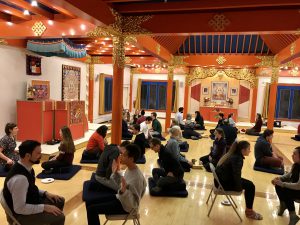Who Am I Without My Phone? Winter Teen Retreat
Through guidance, inquiry and activities built from Sakyong Mipham Rinpoche’s new book, The Lost Art of Good Conversation, the Winter Teen Retreat at Karmé Chöling was an incredibly rich program. Seventeen out of twenty teenagers turned in their cell phones for the week while we practiced “Who am I?” “Who am I really?” and even, “Who am I without my phone?”
Shastri Nick Kranz and Jade Kranz led a Simplicity retreat the same week with teachings also based upon The Lost Art of Good Conversation. After a few days of practicing what a “good” conversation might sound, look, and feel like, the Teen Retreat sat one-on-one in conversation with Simplicity participants and Karmê Chöling staff. No emoticons, no distractions, just eye contact and careful engagement for a twenty minute conversation with a stranger. Beautiful, brilliant, awkward, and genuine conversation emerged, with every single participant from both age groups feeling inspired and appreciated as a result.
 Teachings on outer, inner, and secret were delved into, along with a Death Salon (discussion about death and mortality), a contemplative walk through an enormous labyrinth, and drill in sub zero temperatures, all woven together throughout the week. All roads led back to The Lost Art of Good Conversation. The teens also had a memorial walk (drill led by Sun Camp graduates) to the Purkhang, to mourn the loss and celebrate the life of a dear friend who had died this past fall.
Teachings on outer, inner, and secret were delved into, along with a Death Salon (discussion about death and mortality), a contemplative walk through an enormous labyrinth, and drill in sub zero temperatures, all woven together throughout the week. All roads led back to The Lost Art of Good Conversation. The teens also had a memorial walk (drill led by Sun Camp graduates) to the Purkhang, to mourn the loss and celebrate the life of a dear friend who had died this past fall.
Over twelve years I have brought three of my own children through Family Camps and Teen Retreats at Karmê Chöling. Some of these were as a Karmê Chöling staff member witnessing the onslaught of Family Camp mayhem. Other times were as a Family Camp staff member, some as a single mother, and most recently as a “partnered” parent. Not only has it sometimes been difficult to be an adult participant or a staff member, but in my experience Family Camps and children’s retreats have not always proven to be a wonderful experience for each and every child–including my own.
 So much of the experience has to do with connections and friends. As a single mother of two young children, I often felt left out and awkward, and sometimes felt a lack of consideration from the community. I’ve witnessed children and teens over the years who have not “clicked” with other kids, and this has broken my heart time and again. As an adult who knows what it is to feel left out, I have thankfully had enough confidence to keep returning over the years, understanding that at any moment things could change for the better. However, for children and teens to feel left out of a camp which occupies their precious summer vacation time, it can be a deeply felt, even devastating experience.
So much of the experience has to do with connections and friends. As a single mother of two young children, I often felt left out and awkward, and sometimes felt a lack of consideration from the community. I’ve witnessed children and teens over the years who have not “clicked” with other kids, and this has broken my heart time and again. As an adult who knows what it is to feel left out, I have thankfully had enough confidence to keep returning over the years, understanding that at any moment things could change for the better. However, for children and teens to feel left out of a camp which occupies their precious summer vacation time, it can be a deeply felt, even devastating experience.
How brave these children and teens are to return season after season to a place that asks them to be still and contemplate how they are feeling–especially when their feelings are not always easy or comfortable. I need to ask this question of myself, and also of the other staff of Shambhala children and teens programs: What are the chances that if we concentrated more on simple direct and careful conversation—slow conversation—we could heal some of the feelings of isolation that sometimes plague patches of our sangha? As helpful as the “left out practice” of Kasungship truly is, it seems to me there is much less benefit to feeling like that when still a child.
 At the end of this particular week at Karmê Chöling, the teens unanimously agreed at the end of the week that they felt better without their phones. They admitted feeling less anxiety, less stress, and not missing the constant feeling of having to “keep up” with friends on social media. Most of them admitted that what they did miss was their music. The turning-in of phones was strongly advised but there was no policing–just a continual check-in with thoughts and feelings surrounding the separation of self and phone.
At the end of this particular week at Karmê Chöling, the teens unanimously agreed at the end of the week that they felt better without their phones. They admitted feeling less anxiety, less stress, and not missing the constant feeling of having to “keep up” with friends on social media. Most of them admitted that what they did miss was their music. The turning-in of phones was strongly advised but there was no policing–just a continual check-in with thoughts and feelings surrounding the separation of self and phone.

Comments
Post a Comment